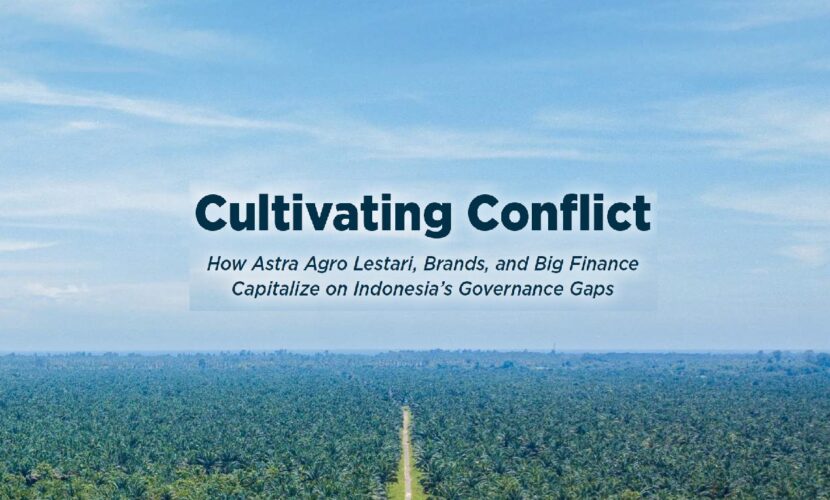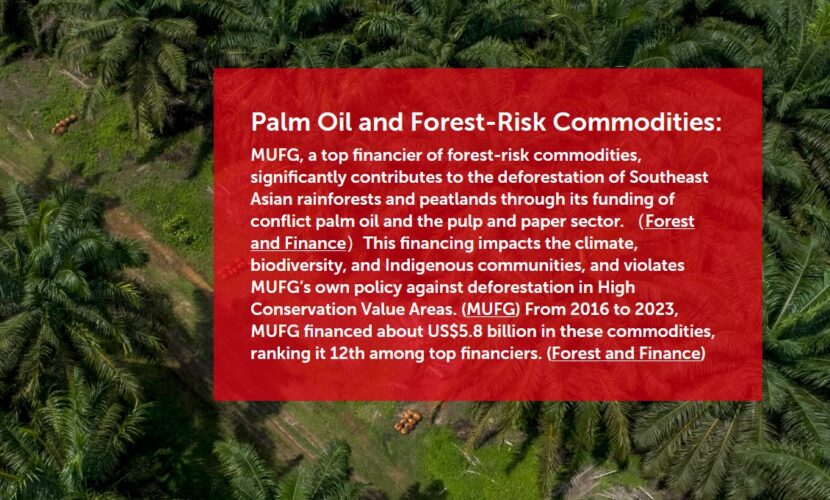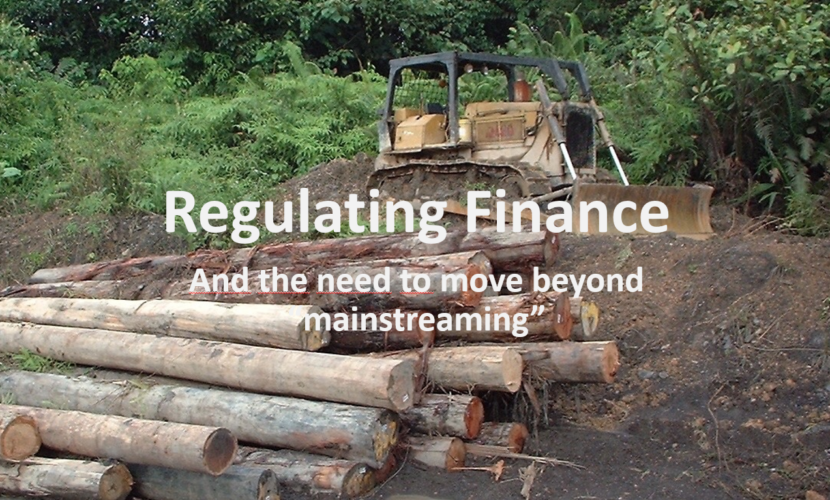News
Two months ago 62 organizations and 3 Goldman Environmental Prize winners wrote an Open Letter to the TNFD: No one responded

Originally published by BankTrack
On 31 May, 62 organizations and networks – whose members include over 370 organizations in 85 countries – wrote an open letter to the Taskforce on Nature-related Financial Disclosures (TNFD). The letter was also signed by three winners of the Goldman Environmental Prize which is akin to a Nobel Prize for environmental activism. It was timed to align with the close of the TNFD’s feedback processes on its fourth draft before it releases its final framework for how businesses should report on their biodiversity risks expected in mid-September.
If the objective of TNFD is to help safeguard biodiversity – then such a united voice from environmental and human rights defenders that its efforts risked not only being ineffective, but detrimental to their work, should have triggered an internal crisis. This could have been met with crisis meetings, mediation attempts, funder talks, independent reviews and deep soul searching. It should have rocked the core of its credibility. (In fact, we heard informally that at least one other initiative shared the letter internally as a cautionary tale.)
Instead, no one replied.
In the following days and weeks, to the best of our knowledge neither the TNFD Secretariat, the individual TNFD taskforce members, the TNFD’s co-founders nor its knowledge partners made an effort to address the substantive concerns of the letter, to ask for additional evidence or information or find a way through the serious concerns raised. TNFD did speak to the media – telling Environmental Finance that it had previously “engaged” civil society organizations and been shaped by their thinking. It did not speak to the substantive points the letter raised.
This is emblematic of the degree of indifference that the TNFD process has to the expertise of biodiversity defenders.
The simplest way to interpret this non-response is that the TNFD thinks either that these groups are stupid – and these concerns aren’t valid, or that they’re irrelevant – so can be overlooked so long as business interests are kept on-side, or both.
New academic work slams the TNFD
In July, a new article in the academic journal Conservation Letters titled “Risky Business” examined TNFD. Unlike much of the TNFD’s own processes which are shrouded in secrecy, the article is open access. Step by step, the article examines many of the assumptions behind TNFD highlighting how they are deeply flawed. As well as its own analysis, it draws on academic work from University College London economists and other researchers, often going back years. This points to a persistent lack of evidence that the model behind TNFD works – pointing to everything from the ‘radical uncertainty’ of predicting where and how biodiversity impacts will occur, to the disincentives and conflict of interests in trusting companies to self-report their own bad practices.
They also question the convoluted rationale behind TNFD: that instead of calling for laws to outline clear obligations for companies on biodiversity, multiple governments are funding a taskforce of companies to come up with their own reporting guidelines; and that these guidelines rely on companies speculating at what future point hypothetical regulations (‘transition risks’) will occur and how these hypothetical regulations may affect the business case for harming biodiversity. Rules that businesses themselves are often lobbying against.
The article also points out that the TNFD’s own definition of ‘nature’ contravenes that of the Convention on Biological Diversity, as well as the more people-centred framework of the Kunming-Montreal Global Biodiversity Framework. To understand why TNFD’s model is convoluted and appears largely ineffective, the authors attribute the problems of the TNFD to a broader issue of corporate capture of public decision-making.
International Indigenous Forum on Biodiversity
Over the past year, the TNFD has failed to respond to calls to provide even the basics needed for public consultation. This is discussed more in the Open Letter and includes a failure of the TNFD to conduct any form of gender analysis of its framework. In fact, the first of the few concessions on consultation is that where groups wanted their feedback on its final draft to be made public; it has stored them on its website. The second is to point to its dialogue with the International Indigenous Forum on Biodiversity.
Unlike TNFD taskforce members and co-founders, which have mostly not provided public submissions, the IIFB have made their submission public. The submission is well-worth reading in full. It highlights that the TNFD’s proposed framework does not accord with international human rights law or the Kunming-Montreal Global Biodiversity Framework or respect Indigenous Peoples’ rights. It makes ample, sensible suggestions for the necessary changes that TNFD must make to align with the actual international law on human rights and biodiversity that preceded it. It also vehemently stresses the point that “rights holders” must not be lumped together with other stakeholders (such as investors) under “stakeholder engagement”. It highlights how vastly out of step the TNFD proposed framework is with the perspective of the foremost Indigenous caucus negotiating under the Convention on Biological Diversity framework.
What could the TNFD do?
Among the concerns raised by CSOs and academics is TNFD’s failure to engage with research that may suggest that lower and middle-income countries could be disproportionately impacted by a repricing of credit. That is, if credit becomes more expensive in places with the greatest risk of biodiversity loss this could have less impact in high-income countries with low biodiversity – such as in Western Europe – because they have comparatively little biodiversity left to lose.
Additionally, the TNFD is operating as a backdoor for global corporations, who are the ultimate decision-makers of the TNFD, to propose weak new rules in order to avoid more impactful regulatory options. This signals that governments, regulators and central banks should push back against concerted campaigns – including by UN agencies – to push a framework decided on by 40 global corporations as a model of future regulation or a potential indicator for the Convention on Biological Diversity targets. Recently, accounting academics have stated that TNFD should rebut any intended use of its framework as a basis for regulation or policy, as this presents a greenwashing and corporate capture risk given the inherent conflicts of interest involved.
As CSOs have persistently pointed out, the TNFD has devoted very little, if any, attention to the question of ‘will this work?’. Nor does it have a ‘do no harm’ or ‘due process’ statement. In fact, after four drafts of its framework, it hasn’t provided a single example of what an actual TNFD report would look like – a point raised by CSOs and businesses alike.
Assuming that the TNFD is unprepared to take these broader concerns seriously, the question also arises as to whether it will amend its framework to close its worst loopholes for greenwashing risks. Many of the points raised by CSOs relate to data and information that businesses already have – and are far less vague and convoluted than much of the TNFD’s model.
The TNFD Secretariat has been provided with information on various models and options for how to do this. For example, businesses should disclose where they are operating, buying from or financing in ways that allow communities to know if they’re involved. Businesses should disclose their actual impacts on nature. Specifically, this should take a form that can be checked against the ground realities – which high-level aggregate data cannot.
CSOs also point out that there is no clear rationale why a ‘disclosure initiative’ does not recommend reporting a grievance list. Businesses should report complaints, such as where third parties are alleging that a company is breaking its own biodiversity policies, violating human rights or other harmful practices. Businesses should also disclose their lobbying. One obvious reason why we don’t have stronger laws and enforcement that see businesses face real consequences for biodiversity harms is that corporations themselves often lobbied against them (see here or here).
A collection of CSO and rightsholder statements, open letters, articles and submissions about the TNFD can be found on the Forests and Finance coalition website here.







